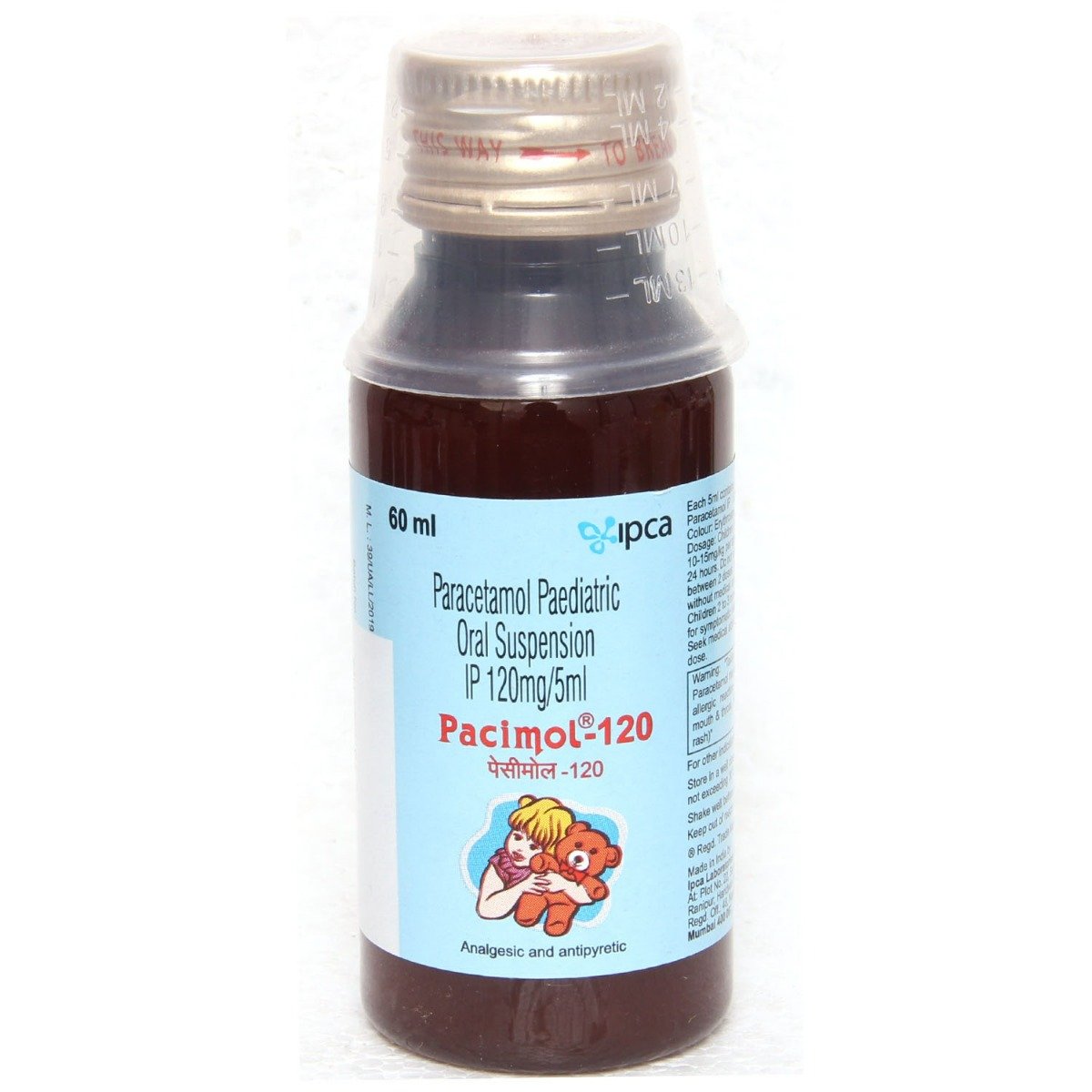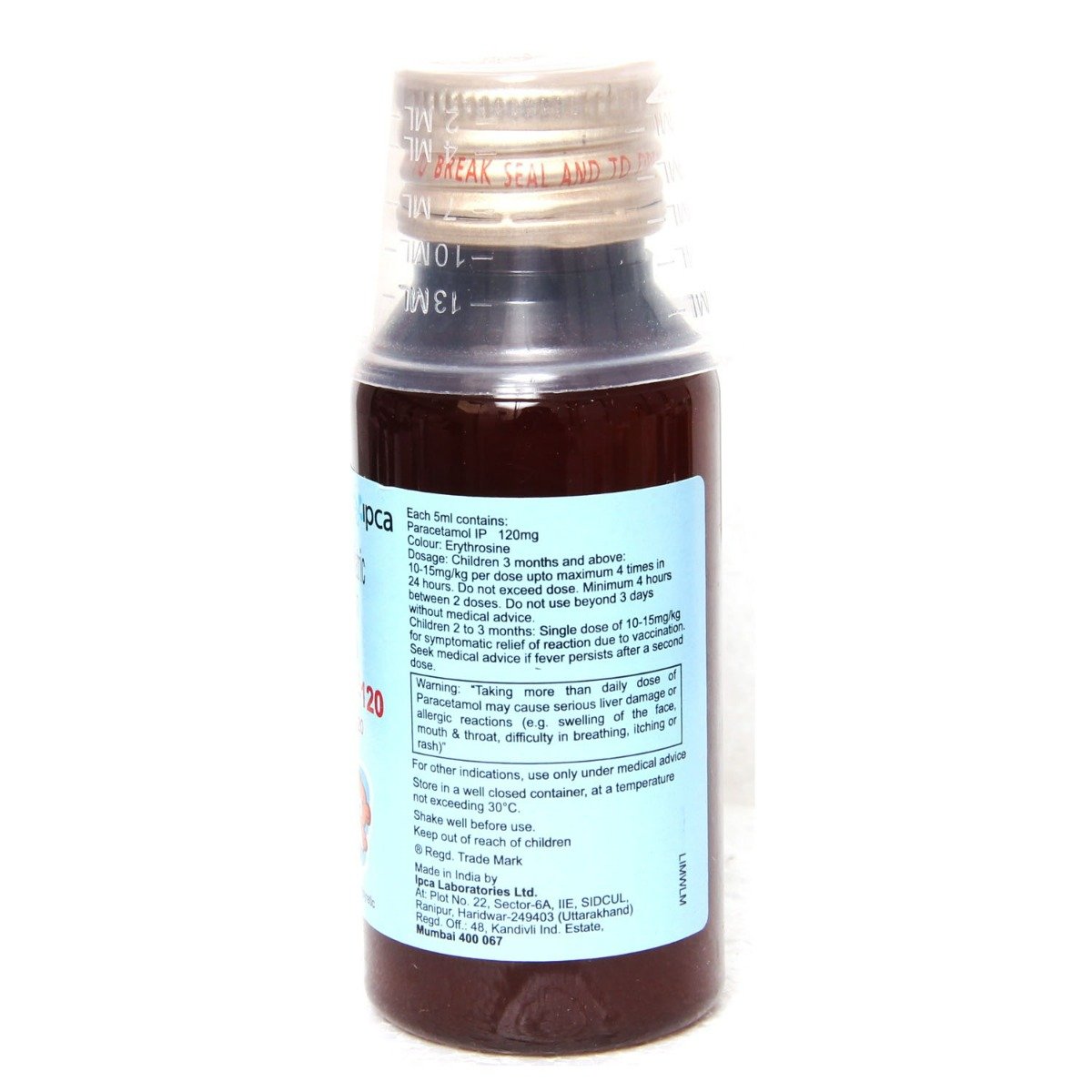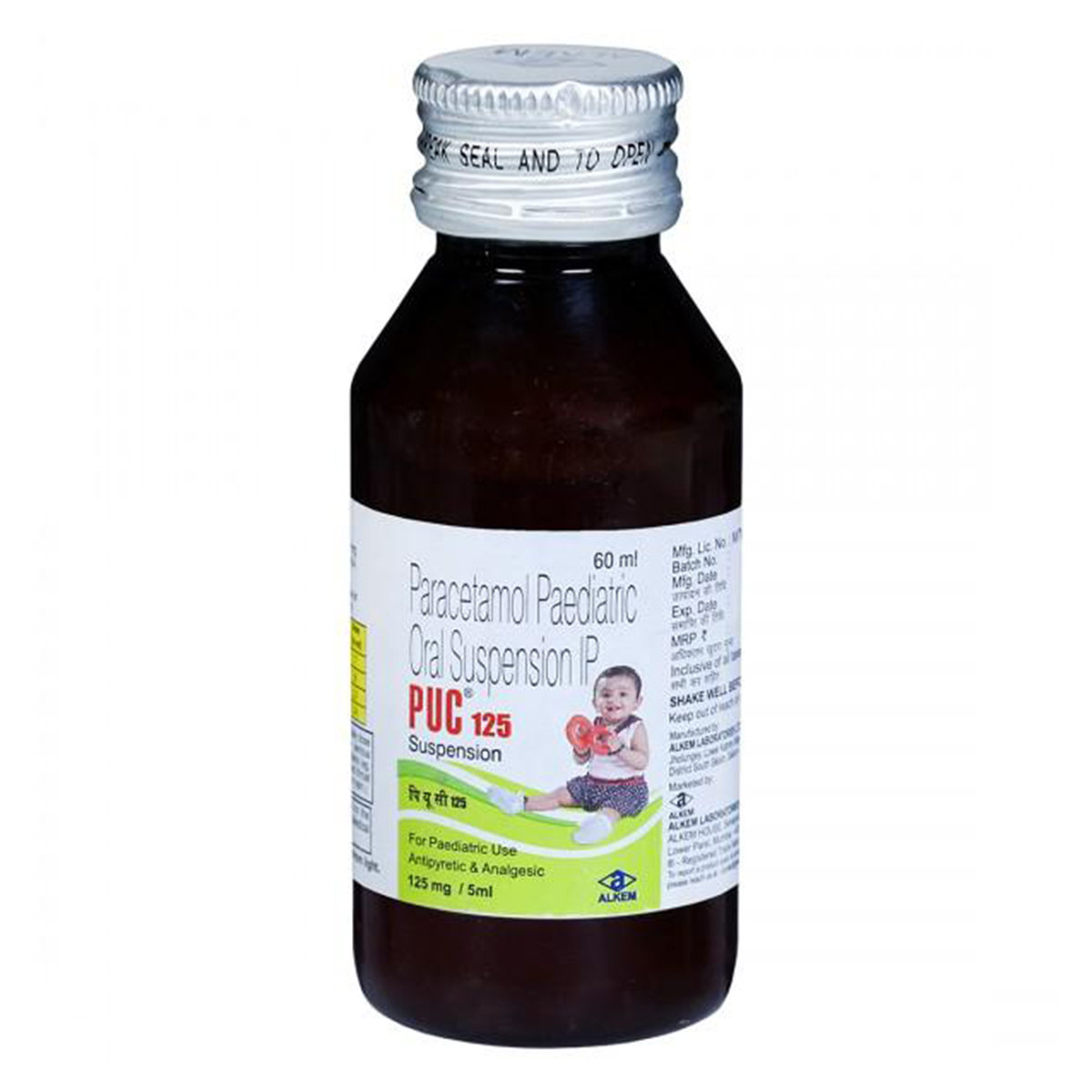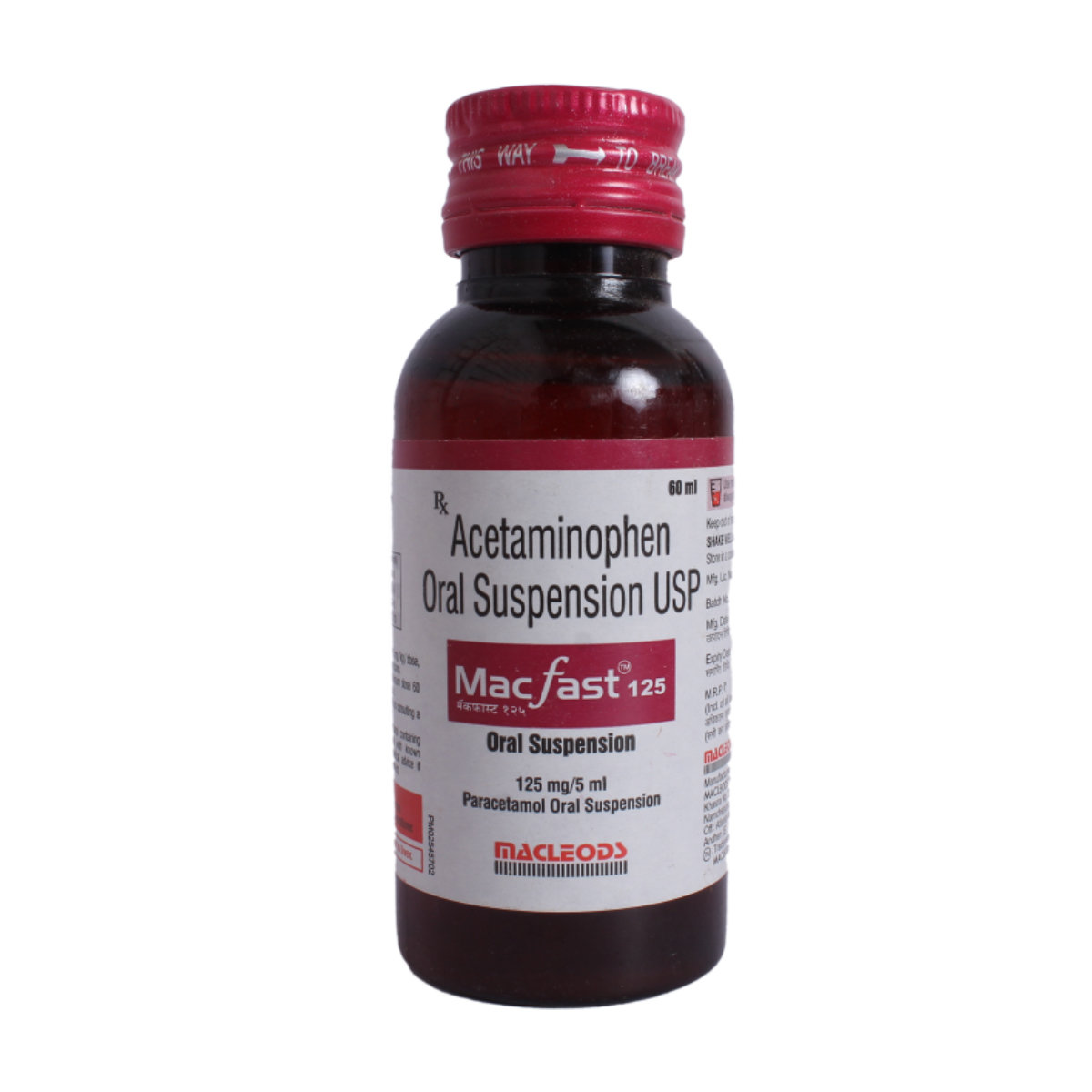Pacimol Oral Suspension 60 ml
Pacimol Oral Suspension test testing product is a non-steroidal anti-inflammatory drug (NSAID) used in relieving pain and fever. Pain can be acute (temporary) or chronic (long-lasting).




MRP ₹39
(Inclusive of all Taxes)
₹5.8 Cashback (15%)
Provide Delivery Location
Online payment accepted
 Prescription drug
Prescription drugWhats That
Composition :
Manufacturer/Marketer :
Consume Type :
Return Policy :
Expires on or after :
About Pacimol Oral Suspension
Pacimol Oral Suspension test testing product is a non-steroidal anti-inflammatory drug (NSAID) used in relieving pain and fever. Pain can be acute (temporary) or chronic (long-lasting). Acute pain is a short time pain caused by damage to the tissues of the muscle, bone, or other organs. Chronic pain lasts for a long duration and is caused due to pathologies like nerve damage, etc. This medicine helps relieve symptoms of muscle pain and dental pain in children. Fever is a high body temperature followed by shivering, headache, and, in severe cases, delirium.
Pacimol Oral Suspension contains Paracetamol which belongs to the antipyretic and analgesic class of drugs. Paracetamol works by blocking the production of a chemical messenger (prostaglandin) and encouraging heat loss (through sweating), which helps reset the hypothalamus thermostat.
Pacimol Oral Suspension may cause certain side effects such as abdominal pain, cold-like symptoms, or diarrhoea. These side effects do not require medical attention and gradually resolve over time. However, if the side effects persist or worsen, please consult your paediatrician. Pacimol Oral Suspension should be used as advised by your doctor. Do not give the child more than the prescribed dose of Pacimol Oral Suspension. Pacimol Oral Suspension can be given with or without food. Your paediatrician will decide the dose of the medicine depending upon the type and severity of the condition.
Pacimol Oral Suspension is intended for pediatric use only. Avoid giving Pacimol Oral Suspension to your child if she/he is allergic to it. Keep your doctor informed about your child’s health condition, medications, and medical history to rule out any side effects/interactions. If your child has liver and kidney disease, inform your doctor before using this medicine. Pacimol Oral Suspension is used in babies below two years of age.
Uses of Pacimol Oral Suspension
Pain, Fever.
Directions for Use
Shake the container well before each use. Measure the required amount of Pacimol Oral Suspension and administer it to your baby. It is advised to measure the quantity accurately with the help of a syringe or dropper containing markings.
Medicinal Benefits
Pacimol Oral Suspension contains Paracetamol as an active ingredient (antipyretic and analgesic). Paracetamol lowers the elevated body temperature and mild pain by inhibiting the synthesis of a chemical messenger (prostaglandin) and promoting heat loss (through sweating) that helps reset the hypothalamic thermostat.
Storage
- Inform Your Doctor: Notify your doctor immediately about your diarrhoea symptoms. This allows them to adjust your medication or provide guidance on managing side effects.
- Stay Hydrated: Drink plenty of fluids to replace lost water and electrolytes. Choose water, clear broth, and electrolyte-rich drinks. Avoid carbonated or caffeinated beverages to effectively rehydrate your body.
- Follow a Bland Diet: Eat easy-to-digest foods to help firm up your stool and settle your stomach. Try incorporating bananas, rice, applesauce, toast, plain crackers, and boiled vegetables into your diet.
- Avoid Trigger Foods: Steer clear of foods that can worsen diarrhoea, such as spicy, fatty, or greasy foods, high-fibre foods, and dairy products (especially if you're lactose intolerant).
- Practice Good Hygiene: Maintain good hygiene to prevent the spread of infection. To stay healthy, wash your hands frequently, clean and disinfect surfaces regularly, and avoid exchanging personal belongings with others.
- Take Anti-Diarrheal Medications: If your doctor advises, anti-diarrheal medications such as loperamide might help manage diarrhoea symptoms. Always follow your doctor's directions.
- Keep track of your diarrhoea symptoms. If they don't get better or worse or are accompanied by severe stomach pain, blood, or dehydration signs (like extreme thirst or dark urine), seek medical help.
- Get urgent medical help if you notice abnormal lung sounds with symptoms, like bluish skin, flare-ups of your nostrils, or trouble breathing.
- If you have asthma or allergies, managing these conditions with inhalers and bronchodilators can help prevent abnormal lung sounds.
- Infections may need antibiotics or breathing therapy to help open your airways and make breathing easier.
- Wash your hands regularly and take other steps to avoid getting sick and spreading germs.
- Doing breathing exercises can help improve your lung function and make breathing easier.
- Contact your physician right away if you suffer from hypoxia symptoms including chest pain, disorientation, or shortness of breath.
- Your doctor can monitor your progress and modify treatment programs with the help of routine follow-up sessions.
- Omega-3 supplements may support the transport of oxygen to tissues.
- Regular exercise improves cardiovascular health and boosts oxygen delivery to tissues.
- Quit smoking, as it can worsen hypoxia.
- Tell your doctor about the cough symptoms you're experiencing, which may be triggered by your medication.
- Your doctor may adjust your treatment plan by changing your medication, adding new medications, or providing guidance on managing your cough symptoms.
- Practice good hygiene, including frequent handwashing, avoiding close contact with others, and avoiding sharing utensils or personal items.
- Stay hydrated by drinking plenty of fluids, such as water, tea, or soup, to help thin out mucus and soothe your throat.
- Get plenty of rest and engage in stress-reducing activities to help your body recover. If your cough persists or worsens, consult your doctor for further guidance.
Drug Warnings
- Pacimol Oral Suspension may interact with antibiotics like Azithromycin and erythromycin. Hence, please maintain a gap of at least 1 hour between the administration of Pacimol Oral Suspension and antibiotics.
Drug-Drug Interactions
Drug-Drug Interactions
Login/Sign Up
Co-administration of Pacimol Oral Suspension 60 ml and Leflunomide may increase the risk of liver problems.
How to manage the interaction:
Although there is a possible interaction between Pacimol Oral Suspension 60 ml and Leflunomide, they can be taken together if prescribed by a doctor. However, if you experience fever, chills, joint pain or swelling, unusual bleeding or bruising, skin rash, itching, less desire to eat, fatigue, nausea, vomiting, abdominal pain, or yellowing of the skin or eyes, contact a doctor immediately. Do not discontinue any medications without consulting a doctor.
Co-administration of ketamine and Pacimol Oral Suspension 60 ml may decrease the effectiveness of Ketamine which could result in a higher blood level.
How to manage the interaction:
Although taking Ketamine and Pacimol Oral Suspension 60 ml together can evidently cause an interaction, it can be taken if a doctor has suggested it. If you're feeling very sleepy or having trouble breathing, it's important to contact your doctor right away. Do not stop using any medications without a doctor's advice.
Co-administration of Pacimol Oral Suspension 60 ml and Valdecoxib may increase the risk or severity of adverse effects.
How to manage the interaction:
Although there is a possible interaction between Pacimol Oral Suspension 60 ml and Valdecoxib, you can take these medicines together if prescribed by a doctor. However, if the side effects worsen, please consult a doctor.
Co-administration of Lomitapide and Pacimol Oral Suspension 60 ml may increase the risk of severity of liver injury.
How to manage the interaction:
Although there is a possible interaction between Pacimol Oral Suspension 60 ml and Lomitapide, you can take these medicines together if prescribed by a doctor. Do not stop using any medications without a doctor's advice.
Co-administration of Teriflunomide with Pacimol Oral Suspension 60 ml may increase the risk or severity of Liver problems.
How to manage the interaction:
Taking Pacimol Oral Suspension 60 ml with Teriflunomide together can possibly result in an interaction, but it can be taken if a doctor has advised it. Do not discontinue any medications without consulting a doctor.
Co-administration of Pacimol Oral Suspension 60 ml may decrease the excretion rate of Oxazepam which could result in a higher serum level.
How to manage the interaction:
Although there is a possible interaction between Oxazepam and Pacimol Oral Suspension 60 ml, you can take these medicines together if prescribed by a doctor. Do not stop using any medications without a doctor's advice.
Co-administration of Pacimol Oral Suspension 60 ml and Ketoconazole may increase the risk of liver injury.
How to manage the interaction:
Although there is a possible interaction between Pacimol Oral Suspension 60 ml and Ketoconazole, you can take these medicines together if prescribed by a doctor. However, if you have joint pain or swelling, fever, chills, unusual bleeding or bruising, skin rash, itching, over-tiredness, nausea, vomiting, loss of appetite, stomach pain, dark-colored urine, light-colored stools, and/or yellowing of the skin or eyes, contact a doctor immediately as these may be signs and symptoms of liver damage. Do not discontinue the medication without consulting a doctor.
Co-administration of Mipomersen with Pacimol Oral Suspension 60 ml may increase the risk or severity of liver injury.
How to manage the interaction:
There may be a possibility of interaction between Pacimol Oral Suspension 60 ml and Mipomersen, but it can be taken if prescribed by a doctor. Do not stop using any medications without talking to a doctor.
Drug-Food Interactions
Drug-Food Interactions
Login/Sign Up
Diet & Lifestyle Advise
The child’s immune system is affected by stress raising the risk of being sick. Hence try progressive muscle relaxation techniques to relieve stress.
Sleeping for 7-9 hours each night can make your child stay fit and safe.
Make your child drink more fluids to avoid dehydration.
Side Effects of Pacimol Oral Suspension
Nausea
Diarrhoea
Abdominal pain
Indigestion
Habit Forming
Therapeutic Class
Pacimol Oral Suspension Substitute

Aquris Parasyp 125 Paediatric Oral Suspension 60 ml
by Others
₹0.33per tabletBabygesic 125 Oral Suspension 60 ml
by Others
₹0.33per tabletPUC Oral Suspension 60 ml
by AYUR
₹0.33per tabletMacfast 125 Oral Suspension 60 ml
by Others
₹0.34per tabletNicetamol Junior 125 mg Strawberry Flavour Oral Suspension 60 ml
by Others
₹0.38per tablet
Product Substitutes
Author Details
We provide you with authentic, trustworthy and relevant information
Drug-Diseases Interactions
Drug-Diseases Interactions
Login/Sign Up
Chronic alcoholics may have a higher risk of hepatotoxicity when using Pacimol Oral Suspension 60 ml. Patients using Pacimol Oral Suspension 60 ml may cause severe liver damage, including acute liver failure that required a liver transplant and resulted in death.
How to manage the interaction:
Pacimol Oral Suspension 60 ml should be used with caution in patients who consume three or more alcoholic drinks a day. Avoid alcohol consumption while taking Pacimol Oral Suspension 60 ml. If you have nausea, vomiting, fever, rash, anorexia (eating disorder), over-tiredness, upper right stomach pain, dark urine, and jaundice, contact your doctor as these may be signs and symptoms of liver injury.
The liver predominantly converts Pacimol Oral Suspension 60 ml to inactive forms. Patients with hepatic impairment may be more prone to toxicity because their minor metabolic pathways are more active.
How to manage the interaction:
Pacimol Oral Suspension 60 ml should be used with caution in patients with kidney insufficiency. Also, it is recommended to avoid drinking alcohol while taking Pacimol Oral Suspension 60 ml.
FAQs
Paracetamol lowers elevated body temperature and mild pain by inhibiting the synthesis of a chemical messenger (prostaglandin) and promotes heat loss (through sweating).
Pacimol Oral Suspension can cause diarrhea as a side effect in some children. If your child has diarrhea that is watery or bloody, call your doctor. Do not use anti-diarrheal medicine unless your paediatrician recommends it.
Yes, Pacimol Oral Suspension is used in treating post-vaccination fever in babies. It also helps reduce injection pain in babies receiving vaccination.
Drug-Drug Interactions Checker List
- AZITHROMYCIN
- KETOCONAZOLE
- ERYTHROMYCIN
- RITONAVIR
Special Advise
Disease/Condition Glossary
Pain: Pain can be short-term (acute) or long-term (chronic). Acute pain is caused by damage to the tissues of the muscle, bone, or organs and lasts for a short time. In contrast, chronic pain lasts for a longer duration. It is caused due to pathologies like nerve damage, osteoarthritis, and dental pain due to damage to the tooth nerve, infection, decay, extraction, or injury.
Fever: Fever is not a disease but a sign that the body is trying to fight an infection or illness in which the body's immune system gets activated to fight infections caused by bacteria or viruses. A normal temperature is around 98.6 F but may vary from person to person. Fever is caused due to the 'pyrogen' released by the hypothalamus part of the brain. This pyrogen causes heat-generating effects to match a new higher temperature set point to fight infection.

Have a query?
Buy best C.n.s Drugs products by
Intas Pharmaceuticals Ltd
Sun Pharmaceutical Industries Ltd
Torrent Pharmaceuticals Ltd
Alkem Laboratories Ltd
Abbott India Ltd
Cipla Ltd
Alteus Biogenics Pvt Ltd
Micro Labs Ltd
Lupin Ltd
Ipca Laboratories Ltd
D D Pharmaceuticals Pvt Ltd
Icon Life Sciences
Mankind Pharma Pvt Ltd
Tripada Healthcare Pvt Ltd
Arinna Lifesciences Ltd
Linux Laboratories Pvt Ltd
East West Pharma India Pvt Ltd
La Renon Healthcare Pvt Ltd
Talent India Pvt Ltd
Tas Med India Pvt Ltd
Zydus Healthcare Ltd
Cnx Health Care Pvt Ltd
Eris Life Sciences Ltd
Leeford Healthcare Ltd
Emcure Pharmaceuticals Ltd
Macleods Pharmaceuticals Ltd
Sigmund Promedica
Aristo Pharmaceuticals Pvt Ltd
Dr Reddy's Laboratories Ltd
Troikaa Pharmaceuticals Ltd
Consern Pharma Ltd
Zydus Cadila
Shine Pharmaceuticals Ltd
Wockhardt Ltd
Ardent Life Sciences Pvt Ltd
Crescent Formulations Pvt Ltd
Theo Pharma Pvt Ltd
Reliance Formulation Pvt Ltd
Ikon Pharmaceuticals Pvt Ltd
Propel Healthcare
Neon Laboratories Ltd
Jagsam Pharma
Msn Laboratories Pvt Ltd
Morepen Laboratories Ltd
Pulse Pharmaceuticals
Sanofi India Ltd
Med Manor Organics Pvt Ltd
Hetero Healthcare Pvt Ltd
Novartis India Ltd
Crescent Therapeutics Ltd
Elder Pharmaceuticals Ltd
Solvate Laboratories Pvt Ltd
Akumentis Healthcare Ltd
Mova Pharmaceutical Pvt Ltd
Psyco Remedies Ltd
Tripada Lifecare Pvt Ltd
Ajanta Pharma Ltd
Cyrus Remedies Pvt Ltd
Medishri Healthcare Pvt Ltd
Cadila Healthcare Ltd
Glenmark Pharmaceuticals Ltd
Matteo Health Care Pvt Ltd
Hbc Life Sciences Pvt Ltd
Lyf Healthcare
Matias Healthcare Pvt Ltd
Mesmer Pharmaceuticals
Alembic Pharmaceuticals Ltd
Capital Pharma
Crescent Pharmaceuticals
Medopharm Pvt Ltd
Alniche Life Sciences Pvt Ltd
Kivi Labs Ltd
Talin Remedies Pvt Ltd
USV Pvt Ltd
Quince Lifesciences Pvt Ltd
Solis Pharmaceuticals
Infivis Life Care
Zuventus Healthcare Ltd
Cadila Pharmaceuticals Ltd
Pfizer Ltd
Wallace Pharmaceuticals Pvt Ltd
A N Pharmacia Laboratories Pvt Ltd
Blue Cross Laboratories Pvt Ltd
Jenburkt Pharmaceuticals Ltd
Lia Life Sciences Pvt Ltd
Mano Pharma
Medley Pharmaceuticals Ltd
Primus Remedies Pvt Ltd
FDC Ltd
Maneesh Pharmaceuticals Ltd
Apex Laboratories Pvt Ltd
Gagnant Healthcare Pvt Ltd
Ozone Pharmaceuticals Ltd
RPG Life Sciences Ltd
Strides Shasun Ltd
Unichem International
GlaxoSmithKline Pharmaceuticals Ltd
Kuresys Labs Pvt Ltd
LA Pharma
Trion Pharma India Llp
Alcohol
Safe
-
Pregnancy
Safe
-
Breast Feeding
Safe
-
Driving
Safe
-
Liver
Safe
If your child has a liver impairment, inform your doctor before using Pacimol Oral Suspension. Your doctor may adjust the dose if required.
Kidney
Safe
If your child has kidney impairment, inform your doctor before using Pacimol Oral Suspension. Your doctor may adjust the dose if required.
Children
Safe
Pacimol Oral Suspension is safe for babies below two years if prescribed by the doctor. Your paediatrician will decide the dose of the medicine. Do not give more than the prescribed dose.
Heart
Safe
Heart Safe Updated
Geriatrics
Safe
Geriatrics Safe Updated







.jpg?tr=q-85)

